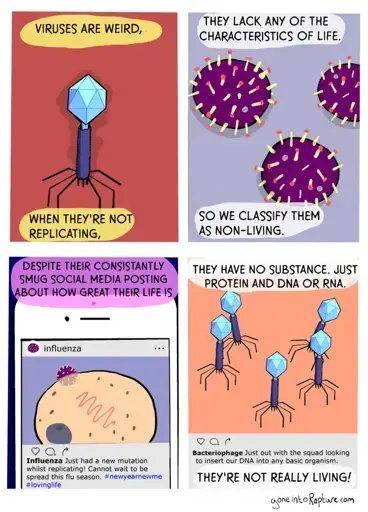Smug Viruses
Smug Viruses


Smug Viruses


True! Here’s a little additional information since the north is in virus season.
A virus is a protein wrapped in a protective fatty lipid. Heat will melt the fat, then break down the protein. That’s why viruses last longer on surfaces and clothing in the cold season, increasing probability of transmission. A virus can remain intact on a shopping cart handle for up to 24 hours in the winter, for example.
You can also rapidly break down the fatty lipid using isopropyl alcohol, or break down the protein directly using hydrogen peroxide. Be careful using the latter. It can bleach or discolor dyed textiles.
Bats use heat to fly off their viruses, they get pretty bad ones, but when they're flying Bats get really hot. So it burns them off.
Also, some viruses have evolved into us and ended up serving functions in the human bawdy.
Yup. Up to 8% of the human genome is comprised of ancient viruses.
As an example we have reverse transcriptase that is derived from viruses.
There was a Kurzegadt video about the virome recently
Another example; mammals probably developed pregnancy using an Autoimmune virus' genes in the placenta to prevent the fetus from being destroyed by the immune system.
That’s why I always carry a small bottle of isopropyl alcohol as my hand sanitizer. It’s also great that my local grocery store has sanitary wipes right beside the carts so you can wipe down the handle before using it.
the swedish department of health says the opposite though, that you have to wash your hands with soap to affect at least some viruses.
Oh, they can spend long periods of time being inert, and then resume activity when conditions change to be more favorable?
... Like a tardigrade? Or a seed?
Oh, they cannot reproduce themselves on their own or within their own species?
... Like a obligate parasite wasp? Or a plant species that relies on a pollinator?
Oh, they do not reach a stable equilibrium within their ecosystem?
... Like humans?
I'll give you that viruses never metabolize and are not capable of homeostasis... but they do not lack 'any' of the characteristics of life, they have some big ones.
They reproduce, evolve, and respond to stimuli.
Prions are just fucking terrifying
Mr. Smith's humanity is a virus speech intensifies

(Yes I know this is a different scene, but its funnier, and Smith's character arc is that he is a virus.)
Agent Smith never heard of Australia.
Not only do they evolve, they evolve more rapidly than any other creatures we're aware of. A virus can mutate almost immediately, whereas other animals require millions of years to display those sorts of dramatic changes.
Complex organisms can also drastically change from point mutations, although such changes are more likely to kill the organism as they grow more complex. Viruses are so incredibly simple and make so many copies that this doesn't matter.
Many organisms can hybridize, which can make drastic changes with much less chance of fatal errors. Plants especially like this; see farmed maize vs wild maize or the entire brassica genus.
Viruses also hybridize though, and can do so much more drastically. Most of the critical genes are in the host, so virus genomes are free to do whatever, and because they highjack other genomes a very small change can radically alter their behavior.
This virus on it's own is absolutely useless and can't adjust to it's environment at all. A parasitic wasp is still a seperate entity that has it's own cells and genetic material that covers all basic function of a living thing. A virus is literally just a protein coat protecting a bit of genetic material. A parasitic organism is still doing cellular metabolism even if it isn't in a host organism, but a virus isn't.
Of course it adjusts to its environment -- it even uses it to replicate. Viruses are that branch of the genome which is being minimalist about its seed pods, other branches need all kinds of superfluous stuff like eyes and limbs and brains and whatnot. Complete waste of resources, having pods which can maintain independent homeostasis, what good does that for the homeostasis of the genome? Eh?
And yet, that wasp will die out in a single generation if it's host disappears. It does most of it's own processing, but it's existence is still contingent on a specific host species. Does that make parasites less alive than other life?
Many insects go through a phase of their lives without a mouth or stomach. They can't eat at all and quickly starve. Are they less alive?
Most life would die out if the sun stopped shining. Does that make chemotrophic organisms more alive than phototrophic life?
Chemotrophic life still needs chemicals to eat, and are completely useless without them. Does that make a Boltzmann Brain the most alive thing possible, coming into existence without any outside action whatsoever?
Plants depend on the sun for energy, animals depend on plants for carbohydrates, we depend on animals and plants for carbs and proteins, mayflies depend on stored energy from their larval stage, parasites depend on other organisms for transportation, food, protection, parenting, and even homeostasis. Viruses depending on other cells for reproduction doesn't seem out of place to me.
Thank you for making the perfect reasonable and easy to understand points! Creatures with parasitic strategies have so many times been misunderstood due to they're reduced bodies and functions. Viruses are the same case.
They're robots! They're machines!
Naturally artificial... artificially natural?
Sounds like something Nestle might try and get away with in the package labelling.
Not really living, according to primates with limited knowledge, and arbitrary definitions.
We invented the word "living", we get to chose what it refers to. We are necessarily right, because this is a truth we create, not a transcendent one. If we collectively decide to change the definition of "living" to include viruses, we will still be right but it won't mean we were wrong before.
Our opinions are not homogeneous and they change in time too.
You joke, but it's still a valid way of doing it.
If we are going be inquisitive in a systematic manner, we have to measure things in comparison, and to start doing that we had to start somewhere, in every single different field. Eventually we got to the speed of light as a constant, figured out the 1/137 fine structure constant, the helical configuration of DNA and RNA, etc., all starting from arbitrary suppositions, getting honed and adjusted by laboratory and thought experiments.
Virus are a proto-lifeform, same as the creators of computer virus.
I've never understood why things have to be binary. There are traits we consider life like and traits we don't. If you have more life like traits you are more life like. Simple as
As far as I'm concerned, it's all just varying levels of physics. Strings vibrate, atoms bounce around, molecules interact, substances react, cells form, organs grow, and consciousness emerges. It's just one long spectrum with a fuzzy and somewhat arbitrary cut-off point to where we determine it life
Physics becomes chemistry becomes biology
Oh for sure. No argument here
I've always liked Hank Green's interpretation of life. In that it's a dynamically stable chemical system. Rather than a statically stable one. Like how a rock doesn't change much but a human is changing constantly. Yet both maintain their chemistry in more or less a balanced state
But physics turns out to NOT be a smooth gradient, there are steps, aka quanta, that's why they call it quantum physics or quantum mechanics, quantum electrodynamics and quantum chromodynamics.
At certain steps - not every step, but at certain mathematically defined points - thresholds are crossed and things behave differently, more energetic or complex phenomena emerge.
Enough of your woke agenda. Keep politics out of science.
/s
eh. if it evolves, it's alive.
There are computer based systems that evolve. The environment is simulated to direct the desired evolutionary direction, the thing is simulated and reproduces and mutates by rule
For example antennas might live in a simulation where the EM waves of the right frequency are feed, with the most nourished antennae breeding to make many children and less nourished antennae having few children; over many generations an excellent high gain antenna with whatever other features were adaptive (size, shape, ...)
I wouldn't call those alive though we use many life associated words to describe them.
I personally would put the life line above viruses, Wikipedia needs to differentiate between viruses and cellular life.
I feel like we will have computer viruses that mutate and evolve and those that can better spread, better avoid detection will thrive while those that cannot will be destroyed. When that happens will we call it life?
Viruses are intra-cellular parasites with both a living and a non-living phase. The particle OP pointed to is just a machine the virus makes to make more viruses.
It's the zip file, it can't do anything until a system unzips it. The resulting program can be really small and still do a lot, especially if it modifies another program.